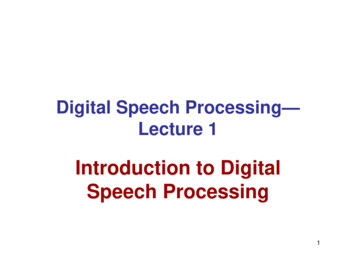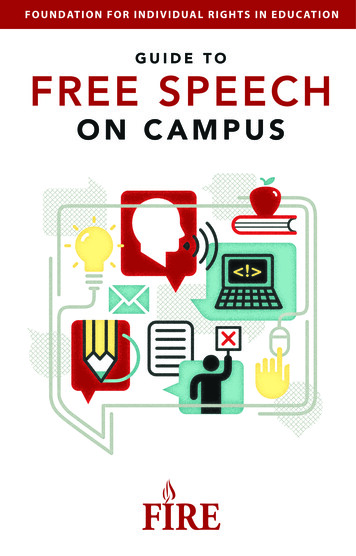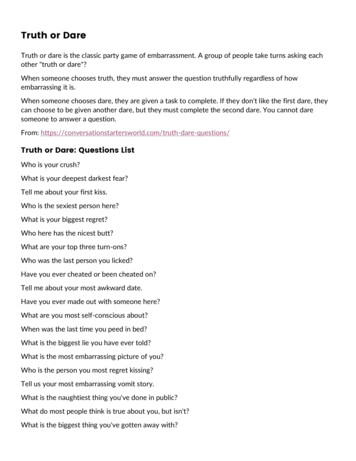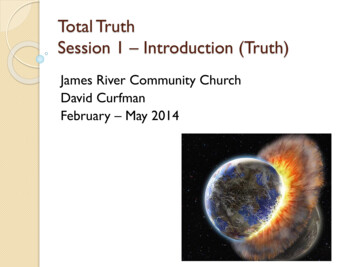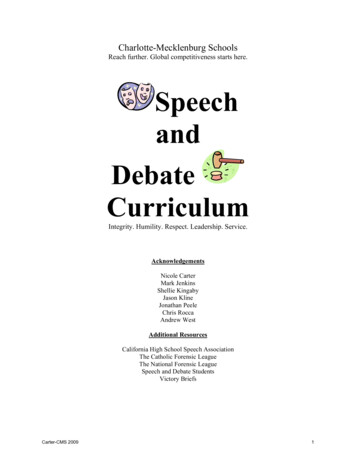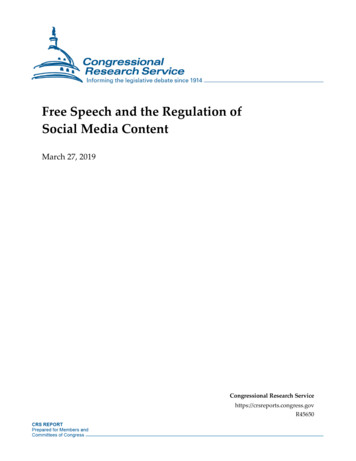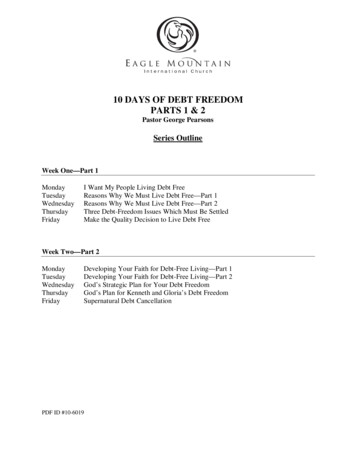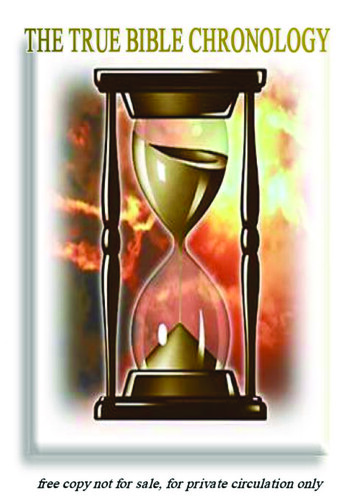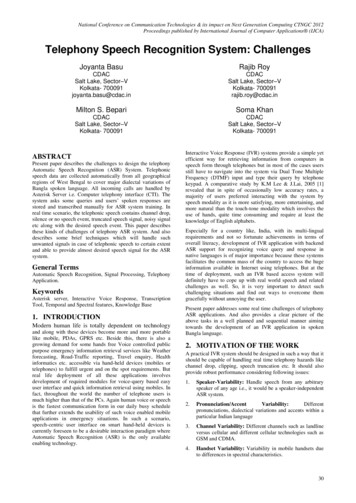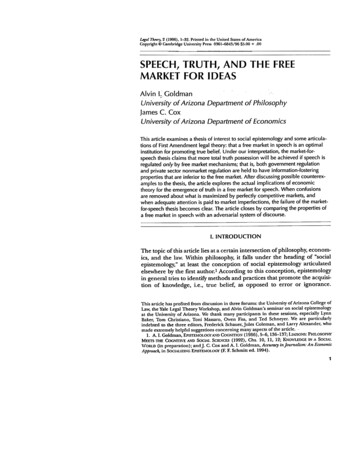
Transcription
i.tga177ltOry,2 (1996), ]-32. Printed in the United Statesof AmericaCop)1ight@ Cambridge Uni\"e il}. Press 0361-6843/96 5.00 .00SPEECH, TRUTH, AND THE FREEMARKET FOR IDEASAlvin i. GoldmanUniversity of Arizona Department of PhilosophyJamesC. CoxUniversity of Arizona Department of EconomicsThis article examines a thesis of interest to social epistemology and some articulations of First Amendment legal theory: that a free market in speech is an optimalinstitution for promoting true belief. Under our interpretation, the market-forspeech thesis claims that more total truth possession will be achieved if speech isregulated only by free market mechanisms; that is, both government regulationand private sector non market regulation are held to have information-fosteringproperties that are inferior to the free market. After discussing possible counterexamples to the thesis, the article explores the actual implications of economictheory for the emergence of truth in a free market for speech. When confusionsare removed about what is maximized by perfectly competitive markets, andwhen adequate attention is paid to market imperfections, the failure of the marketfor-speech thesis becomes clear. The article closes by comparing the properties ofa free market in speech with an adversaria.l system of discourse.I. INTRODUCTIONThe topic of this article lies at a certain intersection of philosophy, economics, and the law. Within philosophy, it falls under the heading of "socialepistemology," at least the conception of social epistemology articulatedelse\vhereby the first author.l According to this conception, epistemologyin general tries to identify methods and practices that promote the acquisition of kno\vledge, i.e., true belief, as opposed to error or ignorance.This articl has profited from disctlSsion in three forums: the University of Arizona College ofLa\V, the Yale Legal Theory Workshop, and Alvin Goldman's seminar on social epistemologyat the University of Arizona. We thank many participants in these sessions, especially LynnBaker, Tom Christiano, Toni Massaro, O\ven Fiss, and Ted Schneyer. We are particularlyindebted to the three editors, Frederick Schauer,jtuesColeman, and Larry Ale ander, whomade extremely helpful suggestions concerning many aspects of the article. .1. A I. Goldman. EPISTEMOLOGYA."DCOGNmON (1986),5-6,136-137;LIAISONS:PHILOSOPHYMEmTHE COG!I,'ffi\"E AND SOCIAl. SCIENCES(1992), Chs. 10, 11, 12; KNO\\'LEDGEIN A SOCIALWORLD (in preparation); andj. C. Cox and A. I. Goldman, Accuracy inJournalism: An EconomicApproach, in SoCIALIZINGEPISTEMOLOGY(F. F. Schmitt ed. 1994).1
2ALVIN I. GOLDMAN AND JAMESC. COXIndividual epistemology is concerned \vith purely private eventsand processes,such as perceptual experience or inference; socialepistemology focuseson public and institutional practices that can foster the acquisition ofkno\\'ledge or information. Among the social practices of interest are practices of speech and communication, through \vhich kno\vledge (and alsoerror) can be transmitte!i from agent to agent. As part of social epistemology, th.en,,ve should iook at alternative frameworks for speech,to see whichframe\vork is optimal from a kno\vledge-promotionstanclpoint. A naturalcandidate here is a free market for speech. Free markets are commonlythought to be "maximizing" institutions, so perhaps a free market forspeechis the optimal instiuttion for the promotion of true belief. There arealready suggestions in the economic literature that markets are good atinformation dissemination or revelation. An example is Hayek's idea thatmarkets are good ,vaysof aggregating dispersed information and makingthat information available to economic agents.2Game theory tells us that,in certain situations, sellers in a competitive market will be constrained toreveal true information about their products.3 Third, in the public choiceliterature, markets are preferred to political decision devicesbecause of theincentives in the latter to misrepresent.4Perhaps these hints generalize toa broader conclusion, viz. that markets are optimal institutions from aninformation-fostering standpoint.This sort of idea has been championed by historical philosophers and20th-century legal theorists, the latter in the context of the First Amendment. Both John Milton and John Stuart Mill contended that free, unregulated speech \vould promote the discoveryand acceptance of truth betterthan the restriction or suppressionof speech.5In more explicitly economicterms,Justice Holmes held that "the ultimate good desired is better reachedby free trade in ideas-that the best testof truth is the power of the thoughtto get itself accepted in the competition of the market. ."6 This Holmesian dictum has been quite influential in legal circles. In 1969, theSupreme Court wrote, "It is the purpose of the First Amendment to pre2. SeeF. A. Hayek, I 'DI\'IDUALIS:'IAND ECONOWCORDER (1948), 85-86. Hayek emphasizes,however, that the price system of the market pro\ides only limited informationto eachparticipant, only the information he or she needs to be able to take the right course of action,not information (for example) about the factors that have caused changes in prices.3. Here, \ve have in mind the Munraveling result," in which sellers are impelled (in equilibrium) to reveal accurate information about their product, because, if they remain silent, buyerswill infer it is \,'orse than it is. SeeD. G. Baird, R. H. Gertner, and R. C. Picker, G \IE THEORYk'JD THE LAw (1994), 89-109. The unraveling result applies, ho\vever, only in very specialcircumstances, namely, where information can be verified once it is disclosed, and where lyingis sanctionable. It is doubtful ho\v far these special circumstances generalize. For discussion ofthese kinds of issues, see subsections IV.C and IV.G below.4. SeeD. C. Mueller, PUBUC CHOICE(1979).5. J. Milton, AREOPAGmCA,A SPEECHFORTHE LIBER1YOFUNUCENSEDPRINTING (1644, H. B.Cotterill ed. 1959); J. S. Mill, On Liberty, in ON LIBER1Y, REPRESENfATI\'EGo\'E&" IE!'.'T, THESUBjEcnON OFWOMEN (1859/1960).6. JllStice Holmes (dwenting) , Abrams v. United States, 250 U.S. 616 (1919), at 630.
Speech, Truth, and the Free Market for Ideas3serve an uninhibited marketplace of ideas in which truth will ultimatelyprevail. ."7 This seemsto affirm what Frederick Schauercalls the "argument from truth" for freedom of speech;8more precisely,it articulates themarketplace version of the argument from truth. As Schauerformulates theidea (though without endorsement), 'Just as Adam Smith's 'invisible hand',viII ensure that the best products emerge from free competition, so too willan inVisible hand ensure that th best ideas emerge when all qpinions arepermitt d freely to compete."9It is debatablejust ho,v seriously legal theorists now take the marketplaceversion of the argtlment from truth. But it is undeniable that a lot of lipserVice has been paid to this idea. Moreover, given the interests of socialepistemology and the aforementioned hints from economics,we believe itis time to look closely and literally at the claim that truth is maximallypromoted by a free market for speech. Just ,vhat does modern economicstell us about markets? Does the analysisof the properties of markets reallyguarantee, or even suggest, that unregulated speech-- rspeech that isregulated only by the market-,vill promote the acquisition of truth morereliably than other institutional arrangements concerning speech?We shallargue that it is not a consequence of economic theory that a free marketprovides the most salutary prospects for truth.An alternative ,Yayto challenge the truth rationale for free speech, ofcourse, is to challenge the assumption that truth is such a paramount valuethat its promotion should swamp all other considerations. This evaluativepremise is certainly quite dubious, as Schauer points out.lO However, weshall concentrate on the factual claim that a free market is the best route totruth. To keep matters clear, let us state the precise claim we shall bedisputing. An initial formulation might be (MMTpO) ("the Market Maximizes Truth Possession"):(MMTPO)More total truth possession\\111be achieved in a free, unregulatedmarket for speech than in a s}'Stemin which speech is regulated.The trouble with (MMTPO) is its implication that speech goes totally unregulated in a free-market system.II This is not an accurate claim, given a7. Red Lion Broadcasting Co. v. FCC, 395 U.S. 367 (1969), at 390. Stanley Ingber cites 10other Supreme Court First Amendment opinions from 1966 to 1981 that are permeated by themarketplace of ideas thesis. SeeIngber, The !oIfarketplace ofIdeas: A Legitimizing Myth, DUKE L. J.(1984), at 2, n. 2.8. FREESPEECH:A PHILOSOPHICALENQUIRY(1982), Ch. 2.9. Id. at 16. Since the quote appears in the chapter entitled "The Argument from Truth,"it is e\ident that by "best" ideas, Schauer means true (or, perhaps, "truest") ideas.10. Id. at 33. Of course, the truth rationale might be \veakened somewhat so that it does notassign truth preeminence among values. We shall not explore this issue, however, since ourconc rn is \.ith the factual premise of the argtlment from u-uth.11. Actually, (MMTPO) speaks of the mametbeing unregulated; but this is contrasted \.ithsituations in \vhich speechis regulaled, with the implicationthat speech is unregtuated in amarket system.
4ALVINI. GOLDMANAND JAMESC. COXplausible definition of "regtllation" (to be presented below). When majortelevision networks decide \vhether to allo\v advertisersor political candidates to air commercial or electioneering messagesover their airwaves bytheir ability to pay the required fee, the net\vorksare exercising controloverspeech. True, they are not using "content" criteria in their decision making;they are using purely financial considerations,like any bLlSinessenterprise.N )netheless,the result is regulation. People who \vould like to speak butcannot afford the price are excluded from this speechforum, whereas theRoss Perots of the \vorld are, in fact, allo\ved to speak. Surely this qualifiesas "regulation," although it is regulation by market mechanisms.What themarketplace-for-ideasthesis seemsto be saying, then, when taken literally.is not that all regulation should be excluded, but that only regulation bymarket mechanisms should be allo\ved, if truth possessionis to be maximized. Presumably,the "free" markets that are envisagedare markets forwhich there is freedom of entry (and exit) for buyers and sellers and anabsence of government control of prices and quantities.12So let us reformulate the earlier principle asfollo\vs:(MMTP) More total truth possession,viII be achieved if speechis regulatedonly by free-market mechanisms rather than by other forms of regulation.Of course, the "other" form of regtuation principally intended is governmental regulation, ",hich is what the First Amendment addresses.But ourformulation of the idea is more general, assertingthe inferiority of all formsof regulation other than market regulation. 13This captures the spirit of thethesiswe shall disc s and reject.We must no", be more specific about what is meant by "truth," "truthpossession,"and "regulation." The primary objects that can be called "true"or "false," in our vie\", are propositions or statements.A proposition is truejltSt in case",hat it saysto be the caseactually is the case,i.e., the "world" iI"the ,Yaythe proposition saysit is.14A proposition can be true whetherpeople kno", it or not. If, as geologists currently hold, Africa and SouthAmerica once split off from a single Ur-continent and drifted apart, theproposition asserting the occurrence of this drift is true independently of12. Freedom of entry does not mean that market entry is costless. It means that no rent isderived from incumbency. i.e., that new agents can enter at a cost that does not exceed the costincurred by incumbents, and, hence, incumbents do not have a competitive ad\'antage overpotential entrants.13. Theorists such as Cass Sunstein and O\ven Fiss deny that there is a legitimate contrastbeUveen market regulation and state regulation, because the state institutes the system ofproperty rights that underpin a market system. We shall address this point more fully insection II.14. The first, formula given here is due to W. Alston, A REAuST CONCEPTIONOF TRUTH(1996). For similar defenses of realist, or correspondence, theories of truth, see also M. David,CORRESPONDENCEA."D DISQUOTATION(1994), F. Schmitt, TRUTH (1994), and A. Goldman,KNO\\1.EDGEIN A SoCIAL WORLD, Ch. 2 (in preparation).
Speech, Truth, and the Free Market for Ideas5anyone belie\ing it. Even if scientists had never discovered the evidencesupporting this theory, the proposition \volud still be true.It is possible (although we doubt it) that Holmes undel"Stoodtruth to bedefinedas the opinion that emerges from the free competition of themarket. Under that definition, it \vould, of course, be trivial that opinionsgenerated under free-market conditions are true. But this is a very baddefinition of truth. Although it could turn out as a matter of fact that a freemarket in speech generates true opinions, that does not convey \vhat ismeantby truth. \-\7hatis true or false depends on the \vaythe world actuallyis, not simply on people's opinions or ho\v they arrive at those opinions.There may be some exceptions to this generalization. If the justness of apolitical choice is wholly determined by \vhether people agree to it, thenthe truth or falsity of a proposition assertingthe justness of a certain choicedepends on whether people agreed to it. Here, opinion seemsto "constitute" truth.15 In a political context, however,"agreement" is presumably notcredal assent or belief in a proposition, but rather endorsement of, orconcurrence in, a collective course of action or institutional arrangement.So, even this is not strictly a casein which beliefin a proposition makes thatproposition true.We do not maintain, nor need proponents of the truth rationale maintain,that every proposition or statement is either true or false. In fact, entiredomains of statements (e.g., according to some people, ethics) may be devoid of truth values.Proponents of the truth rationale could still support thedesirability of unregulated speechbecauseof the truth benefits flowing fromthe remaining statements or propositions that are truth-valuable. Not allspeech, of course, conveyspropositions. A good deal of artistic expressionmay be nonpropositional in content. Proponenrscofthe truth rationale caneither say that these forms of expression should be protected only as anincidental matter, or can offer a different styleof rationale for them.We turn no\v to the idea of truth possession,\vhich is used in (MMTP).To say that a person "possesses"a truth is to say that he or she believes aproposition and it is true. Thus, when (MMTP) talks of obtaining thegreatest amount of truth possession through market mechanisms, it istalking about the amount of true beliefor opinion,as contrasted with falseopinion or no opinion at all. Each agent's quantity of truth possessionmight be represented by his or her ratio of true beliefs to true-beliefs-plusfalse-beliefs, or perhaps the ratio of true beliefs to 6Since (MMTP) is presumably interested in thesocial aggregate of truth possession,the relevant ratio should encompassall members of sQciety.So the social ratio \vould be the total number oftrue beliefs (or believings) by members of society divided by the-totalnumber of true beliefs, false beliefs, and no opinions. Of course, belie!15. Thanks to Frederick Schauer for this suggestion.16. For further discussionof theseand related proposals. seeGoldman, supranote 14,Ch. 3.
6ALVIN I. GOLDMANANDJAMESC. COXcan be conceptualized in graded terms as ,veIl as in binary (all-or-none)terms. For graded belief, the foregoing idea could be expressedas follows:Measuring degrees of belief from 0 to 1.0, the higher one's degree ofbelief in a true proposition, the greater is one's degree of "possession"ofthat truth. Conversely,the gr ater one's degree of belief in a false proposition, the more this detracts from truth possession. In other words, adegree-of belief D (0 D 1) in a falsehood counts as (1 -D) ,vorthof truth 'possession.To represent the social aggregate of truth possession,we might then take the average (mean) truth possessionacross all individuals over the propositions considered by members of society.This formula would not solve all problems of quantification. For example, it seemsimplausible to weight all propositions equally. Believing a (true) law ofphysics or a (true) econa;mic principle intuitively seems like a more significant cognitive accomplishment than believing a more humdrum truth.This might be handled by providing a measure of the "interest" of aproposition, but ,ve shall not explore this possibility in detail.17The foregoing provides at least a rough idea of how total truth possessionmay beconceptualized,even if it does not provide a full set of measurement techniques for implementing the conceptualization. This should suffice forpurposes of the arguments to be offered in this article. Anyone wishingto defend (MMTP) against our arguments is invited to propose an alternative conception of truth possession if they think such an alternativecould advance their defense of (MMTP).The next problem of definition is posed by the term "regulation" (asapplied to speech). We shall make some working proposals. Speechis anattempt by one party, a messagesender, to commQnicate .with a secondparty, an intended audience or set of receivers. Communication alwaysusessome type of "forum," such as a public park or billboard, a private livingroom, a ne,vspaperor journal, a television station, or electronic bulletinboard. Messagesare transmitted via a channel or medium s ch as lightwaves,sound ,vaves,print, cables, or the like. Forums of speechand channels of communication are frequently controlled by third parties, peoplewho are in a position to enable or prevent a potential speaker from usingthe desired forum or channel to communicate his or her message.A firstform of regulation, then, consistsof a third party allowing or disallowingselected speakersfrom using the forum or channel to send certain messages.Potential receivers, of course, are also in a position to decline toreceivespeakers'messages,by refusing to watch, listen, or read,by changing17. SeeGoldman, supranote 14, for further discussion. To register differences in interest orimportance, the representation of the social aggregate of truth possessionmight weight moreheavily each agent's true beliefs in propositions that interest him more. This approach might.help addreSsthe ',"orry expressed by Larry A. Alexander about the variable importanceindividuals attach to information. SeeAlexander, Troubleon TrackTwo: IncidentalRegulationsofSpeechand FreeSpeechTheory,H.\sTINGSL.J. 44 (1993): 939-941.
18. The example is due to T. Scanlon, Content Regulation Reconsidered,in DEMOCRACYANDTHEM-\SSMEDl. U. Lichtenberg ed. 1990).19. Other examples might be adduced to suggest that second parties, as ,veil as third parties,can engage in the second form of regulation. Since this point is inessential to our overall thesis,,.e ,viII not pursue the matter further.
8ALVIN I. GOLD.\IAN AND JAMESC. COXagents or institutions that constrain the speech-regulating activities ofother agents. For example, if the federal government passesa law requiring radio and television stations to give political candidates free air time,that will presumably influence the speech-controlling activities of stationmanagers.Those managersare the direct controllers of messagessent overtheir channel, but the government, in this case,would be an indirectregulator.Another crucial phrase that occurs in (MMTP) is "market mechanism."Thus, it might be appropriate to undertake a definition of this phrase.Unfortunately, the precise definition of a market, or a market mechanism,is a knotty problem that would take us too far afield. We shall therefore relyon the reader's ability to assesswhich mechanisms are or are not marketmechanisms.We do not deny that some problematic or borderline examples will crop up, but we also feel that the tenability of (MMTP) can beassessedthrough relatively clear cases,aswell asby a close look at the theoryof competitive markets.II. OTHER DISCUSSIONS OF MARKETPLACE THEORYHaving clarified the version of marketplace theory we ,\'ish to address,wenow proceed to comment briefly on other recent discussionsof the marketplace theory, identifying points of similarity or contrast with our own treatment. Although there are numerous critics of the marketplace theory, wefind some of their criticisms ill-founded, and others simply have a differentfocus from ours. Certain critics of marketplace theory, for example, takeissue with the notion of objective truth. C. Edwin Baker writes; "[T]ruth isnot objective. Even in the sciences,the presumed sanctuary of objectivelyverifiable truth, often only those values to which the scientists personallygive allegiance provide criteria for judging benveen competing theories."20This theme is echoed by StanleyIngber: "Although the assumption of theexistence of objective truth is crucial to classicmarketplace theory, almostno one believesin objective truth today. .[H]istoryis founded on theselective perception of historians rather than on any objective historicaltruth. The same can be said for the pursuit of truth in any academic,scientific, or professional discipline. The 'truth' of a theory depends on itsability to explain a phenomenon to thejudging individual's satisfactionandon its aesthetic appeal to that individual. Today's truth, consequently, maybecome tomorrow's superstition."21We do not accept this blanket rejection of objective truth. As indicatedearlier, there may be statementsin some domains that lack objective truthvalues, but a global denial of objective truth is unwarranted. Among the20. Baker, ScopeoftheFirst AmendmentFreedomofSpeech,UClA L. REv.25 (1978): 974.21. Ingber, TheMarketplaceofIdeas:A LegitimizingMyth,DUKEL.J. 84 (1984): 25.
Speech, Truth, and the Free Market for Ideas9many plausible candidatesfor objective truth and falsehood are statementsof criminal or historical fact (e.g., who fired a gun on a certain occasion,who was the twelfth President), statementsconcerning chemical or nutritional properties of commercial products, and causal statements to theeffect that certain consequenceswould follow from the adoption of this orthat policy. The general legitimacy of objective truth cannot be argued hereat length, but we find the anti-truth contentions of the foregoing criticsunpersuasive.Particularly unpersuasiveis the suggestionthat the mutabilityof beliefs undercuts objectivetruth. The mere fact that there wasextendedcontroversy over continental drift, and many geologistschanged their opinions over time, hardly proves, or even suggests,that there is no objective,belief-independent truth about continental drift. No doubt, it is difficult toget "conclusive" evidence for the truth in any complex and difficult subject,but that does not prove that there is no objective truth. Our own argumentsagainst the marketplace theory ,viII not rest on any skepticism or nihilismabout truth.A second argument by the same critics is that truth is not discoverable(even if it exists) becausepeople lack the rational capacities needed todetect truth. Baker, for example,writes:The classic model also requires that people be able to use their rationalcapacities to eliminate distortion caused by the form and frequency of message presentation and to find the core of relevant information or argument.This assumption cannot be accepted.Emotional or "irrational" appeals havegreat impact; "subconscious" repressions, phobias, or desires influencepeople's assimilation of messages;and, most obviously, stimulus-responsemechanismsand selectiveattention and retention processesinfluence understanding or perspectives.22This assessmentis more pessimistic, 'e suspect,than empirical research,varrants,23but even if things are as bad as Baker implies, this would notcut against the truth rationale, or (MMTP). (MMTP) makes a comparativeclaim; it saysthat a free market is betterat producing truth possession(orknowledge) than a systemthat features extra-market regulation. This comparative thesis is compatible ,\ith the view that all systemsdo badly inabsolute terms because of pervasive irrationality. Even if the knowledgeoutputs of a free market are far from perfect, as long as they are betterthan those of an otherwise regulated system,this would suffice for thetruth of (MMTP).A third argument proceedsfrom inequalities of resourcesor opportunitiesin the marketplace. This argument against the marketplace theory is en22. Baker, Supranote 20, at 976.23. SeeZ. Kunda, The CasejOTMotivatedReasoning,P HOLOGJCALBULLE11N108 (1990):480-498, and A. Goldman, Psychologica Socia andEpistemicFactorsin the Theory ofScience,inPSA 1994,VOL. 2 (M. Forbesed. 1995).
10ALVIN I. GOLDMANAND JAMESC. COXdorsed by many\vriters, especiallyO\venFissand CassSunstein.24Fissarguesin favor of state regttlation to enrich public debate, in the sensethat all positions would be fully and fairly presented. "The State must act as a highminded parliamentarian, making certain that all vie\vpoints are fully andfairly heard."25This will not necessarilybe accomplished by a free market. Infact, saysFiss,noninterference "is likely to produce a public debate that isdomina,ted,and thus constrained,by the same forces that dominate socialstructure, not a debate that is 'uninhibited, robust, and wide-open."'26Although we concur \\ith Fiss'sstatementsabout the likely implications of noninterference in the market,we do not necessarilyaccepthis conclusion aboutstate regulation.27In any case,Fissdoes not explicitly c6nnect the problem\vith the truthargument. The objective on which he focusesis robust debate,\vhich mayor may not have truth acquisition as its ultimate end. Furthermore, although the criticism is apt, we would like to embed it in a deeperanalysisof the difficulties confronting an economic analysisof speech.Sunstein also supports greater governmental activity in the interest ofbetter speechpractices. In order to prgmote political "deliberative autonomy," the state may properly require free air time for candidates,and mayinstitute suitable campaignfinance laws.28But Sunstein again differs fromus in not focusing explicitly on the truth goal. He interprets the principalaim of free speech to be the Madisonian goals of political equality anddeliberative democracy, in which citizens are exposed to diverse views.29Although these goals may be related to the truth goal (e.g., exposure todiverse\ie\\"Smay enhance the prospectsfor truth, and possessionof truthmay contribute to more effective deliberation). they do not coincide withthe truth goal. Thus, our focus \vill be somewhatdifferent.Along\\ith other recent \vriters, Sunstein also challenges the traditionalcontrast benveen the state and the market. The market is itself a creature"of the state,he stresses,through its allocation of property rights and its la\vsof contract and tort.so We take issue with this point, at least as a universalclaim. Although someimportant marketsare undoubtedly shaped by government, not all markets are creatures of the state. For example, trade across24. O. M. Fiss, }7Iythe State?,BAR\".L REv. 100 (1987): 781, and StateActivism and StateCensorship,Yo\LEL. j. 100 (1991): 2087;C. R. Sunstein, FreeSpeechNow,U. CHIC. L REv. 59(1992): 255, and DEMOCRACYM"DTHEPROBLEMOFFREESPEECH(1993).25. Fiss,StateActivismand StateCensor:ship,at 2100.26. Fiss, \7Iythe State?,supra note 24, at 786. The final phrase originates with justiceBrennan, in Ne\vYork Times v. Sullivan,3i6 U.S. 254 (1964) at 270.27. The state is suspect, of course, on tWo types of grounds: (1) it is not (aI\vays) adisinterested party, and (2) it may not be a wholly competent truth-oriented regtuator. Thisneed not imply, of course, that state regulation never promotes truth acquisition or erroravoidance. In fact, we shall present ostensiblecasesof this sort in section III. But, as \ve shallindicate, most of thesecasesare open to debate.28. DEMOCR.cyANDTHEPROBLE.\IOFFREESPEECH,supranote 24, at 34.29. [d. at X\;-xx, 18-23,51.30. [d. at31.
Speech, Truth, and the Free Market for Ideas11front lines in a war, and the current illegal drug trade, constitute marketsthat are not a function of state authorization. Furthermore, even to theextent that markets are creatures of the state, this does not obliterate thedistinction that (MMTP) marks, \1Z.,the distinction between regulation bymarket mechanisms and other forms of regulation, governmental andotherwise. So, a marketplace proponent of the truth rationale can stilIcontend that market regulation is preferable to other stylesof regulation intruth-related terms. Whether this contention is correct is another matter.Daniel Farber analyzesFirst Amendment doctrine from a market perspectiveand identifies an economic property of speechas the rationale forits protection.31 Specifically,Farber argues that speech-or "information,"as he puts it-is a publicgood,and is, therefore, likely to be undervalued byboth the market and the political system.According to Farber, this is thereason behind a special constitutional protection for information-relatedactivities. We shall also examine speechas a plausible example of a publicgood (seesection IV), but we shall draw slightly different conclusions fromthis analysis.The marketplace .discussantsthus far surveyedare legal theorists, but themarket model for speechhas also been studied, of course, by economists.Certain economists,including Aaron Director and Ronald Coase, simplyassumeth
truth. To keep matters clear, let us state the precise claim we shall be disputing. An initial formulation might be (MMTpO) ("the Market Maxi-mizes Truth Possession"): (MMTPO) More total truth possession \\111 be achieved in a free, unregulated market f
